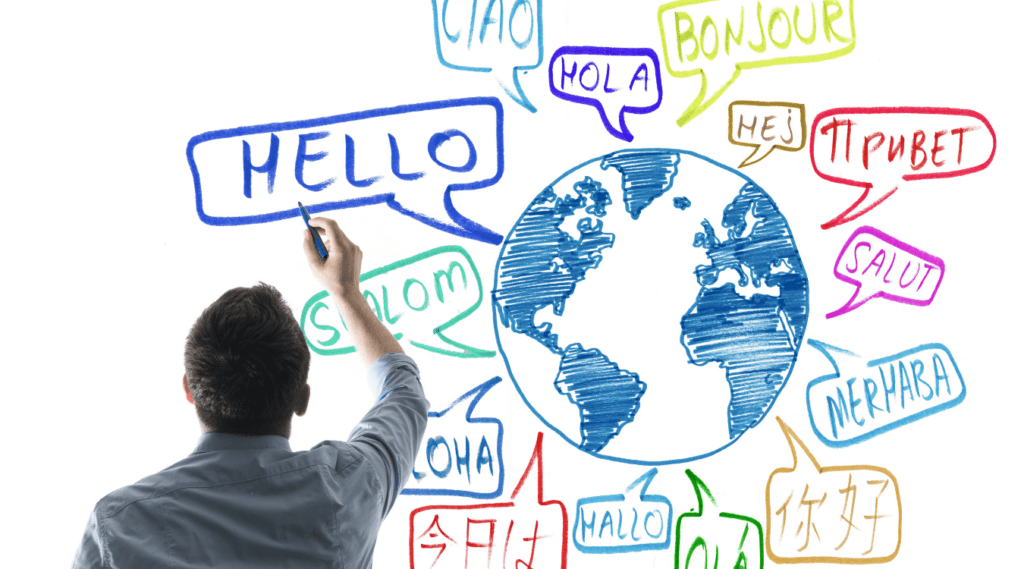1. Why are multilingualism and cultural awareness important?
see all the answers below
2. What are some benefits of being culturally aware?
3. How can I leverage my multilingualism in a new country?
4. How can I go beyond language learning to be culturally aware?
5. What advice does the blog offer for people from different countries?
The world is shrinking as borders blur. In this interconnected age, opportunities transcend national boundaries, making your ability to navigate different languages and cultures not just a bonus but a superpower.
For many professionals considering a move to a new country, a unique advantage already exists: multilingualism and cultural awareness. This isn’t just about personal traits; it’s about possessing valuable assets that can open doors, build bridges, and propel you towards success in your new home.

Embrace Your Linguistic Diversity:
Imagine connecting with colleagues, clients, and communities on a deeper level simply by understanding their language. Multilingualism empowers you to:
- Build trust and rapport: Speaking someone’s language demonstrates respect for their culture and heritage, fostering invaluable trust in business and personal interactions.
- Boost your career prospects: Multilingual candidates stand out in a globalised job market. Your ability to communicate in multiple languages can open doors to new opportunities and promotions.
- Become a bridge between cultures: As a multilingual individual, you can bridge communication gaps, fostering understanding and collaboration between diverse groups.
Why are multilingualism and cultural awareness important?
Multilingualism and cultural awareness help you build trust, boost your career prospects, and bridge communication gaps in today’s interconnected world.
Cultural Awareness: Your Invisible Asset:
Beyond language, understanding different cultural nuances is equally important. This includes:
- Communication styles: Recognising how different cultures approach communication, from directness to indirectness, can prevent misunderstandings and ensure effective interaction.
- Social norms and etiquette: Being mindful of cultural norms and respecting local customs demonstrates your sensitivity and builds positive relationships.
- Values and beliefs: Understanding different cultures’ underlying values and beliefs allows you to navigate situations with empathy and respect.
What are some benefits of being culturally aware?
Cultural awareness helps you avoid misunderstandings, navigate situations respectfully, and build positive relationships with people from different backgrounds.
Leveraging Your Strengths:
So, how can you make the most of your multilingualism and cultural awareness? Here are some tips:
- Network with your community: Connect with other professionals from your home country who have successfully transitioned to your new environment. They can offer invaluable advice and support.
- Seek out opportunities to use your languages: Volunteer in your community, participate in cultural events or find work that utilises your language skills.
- Continue learning: Embrace lifelong learning by taking language courses, attending cultural events, and reading books about different cultures.
- Be confident and proud: Celebrate your diverse background and the unique perspective you bring to the table. Don’t be afraid to share your cultural experiences and insights.
How can I leverage my multilingualism in a new country?
Network with your community, seek opportunities to use your languages, and continue learning to maximise your language skills.
Cultivate Cultural Awareness:
Go beyond language: While language is key, true cultural awareness delves deeper. Explore your new environment’s history, traditions, values, and social norms. This understanding fosters respectful interactions, avoids faux pas, and builds trust.
Embrace lifelong learning: Cultural nuances are constantly evolving. Embrace the continuous learning journey, be open to feedback, and actively seek opportunities to immerse yourself in the local culture.
Be a cultural ambassador: Share your own cultural heritage with others! This fosters mutual understanding and appreciation and breaks down stereotypes. Remember, cultural exchange is a two-way street.
How can I go beyond language learning to be culturally aware?
Explore the history, traditions, and values of your new environment, embrace lifelong learning, and share your own cultural heritage with others.
Tailored Advice for Different Audiences:
- Nigerians: Leverage your strong communication skills and entrepreneurial spirit to excel in business, healthcare, and education. Highlight your fluency in English and any indigenous languages for wider reach.
- Filipinos: Your renowned work ethic and patient care expertise are highly valued in healthcare and hospitality. Showcase your English proficiency and cultural sensitivity to build trust with patients and colleagues.
- Indians: Your technical prowess and adaptability make you sought-after in IT, engineering, and finance. Emphasise your multilingualism, including Hindi and regional languages, to cater to a diverse clientele.
- Pakistanis: Your entrepreneurial spirit and strong work ethic shine in business and finance. Promote your multilingualism to connect with clients from various backgrounds, especially in Urdu and English.
- Zimbabweans: Your resilience and resourcefulness are valuable assets in various sectors. Highlight your English fluency and any additional languages to broaden your career options.
What advice does the blog offer for people from different countries?
The blog offers tailored advice on how to highlight strengths and skills relevant to specific countries, while emphasising the importance of respecting all cultures and embracing lifelong learning.
Remember:
- Every language and culture is unique and deserves respect. Approach each interaction with an open mind and a willingness to learn.
- Embrace your identity: Your cultural background and multilingualism are your strengths, not something to hide. Share them with pride and confidence.
- Be a lifelong learner: The journey of cultural awareness is continuous. Embrace new experiences, seek feedback, and keep growing.
Multilingualism and cultural awareness are powerful tools for success in today’s globalised world. Embrace your unique identity, celebrate your diverse skills, and use them to connect, contribute, and thrive in this interconnected world. Remember, the world is your stage, and your multilingualism is your superpower!











